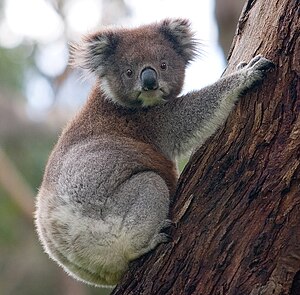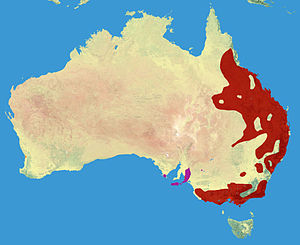Koala - Phascolarctos cinereus: Difference between revisions
No edit summary |
m (Paige moved page Koala to Koala - Phascolarctos cinereus) |
Revision as of 14:25, 9 July 2023
| This page is considered an article stub and needs expanding. Please consider adding your knowledge to this page. WikiAnimal was founded April 2023 by a small, but growing, community of animal enthusiasts If you, like us, are animal fans please consider joining WikiAnimal and help spread knowledge, compassion and a love of animals around the world. |

The koala or, inaccurately, koala bear (Phascolarctos cinereus), is an arboreal herbivorous marsupial native to Australia. It is the only extant representative of the family Phascolarctidae and its closest living relatives are the wombats. The koala is found in coastal areas of the mainland's eastern and southern regions, inhabiting Queensland, New South Wales, Victoria, and South Australia. It is easily recognisable by its stout, tailless body and large head with round, fluffy ears and large, spoon-shaped nose. The koala has a body length of 60–85 cm (24–33 in) and weighs 4–15 kg (9–33 lb). Fur colour ranges from silver grey to chocolate brown. Koalas from the northern populations are typically smaller and lighter in colour than their counterparts further south. These populations possibly are separate subspecies, but this is disputed.
Koalas typically inhabit open Eucalyptus woodland, as the leaves of these trees make up most of their diet. This eucalypt diet has low nutritional and caloric content and contains toxins that deter most other mammals from feeding on it. Koalas are largely sedentary and sleep up to twenty hours a day. They are asocial animals, and bonding exists only between mothers and dependent offspring. Adult males communicate with loud bellows that intimidate rivals and attract mates. Males mark their presence with secretions from scent glands located on their chests. Being marsupials, koalas give birth to underdeveloped young that crawl into their mothers' pouches, where they stay for the first six to seven months of their lives. These young koalas, known as joeys, are fully weaned around a year old. Koalas have few natural predators and parasites, but are threatened by various pathogens, such as Chlamydiaceae bacteria and koala retrovirus.
Threats to the Koala population

Among the many threats to their existence are habitat destruction caused by agriculture, urbanisation, droughts, and associated bushfires, some related to climate change. In February of 2022, the koala was officially listed as endangered in the Australian Capital Territory, New South Wales, and Queensland.
